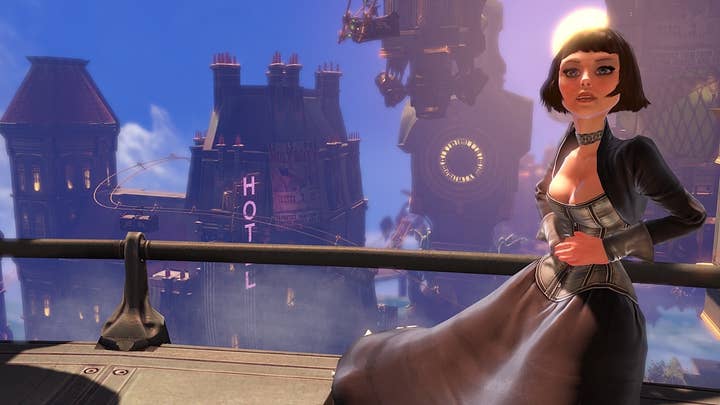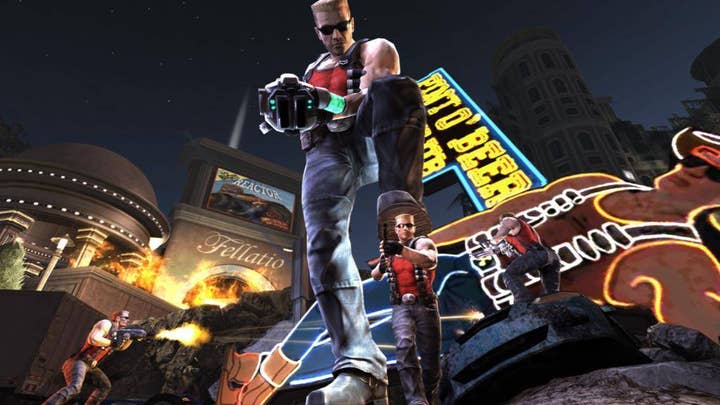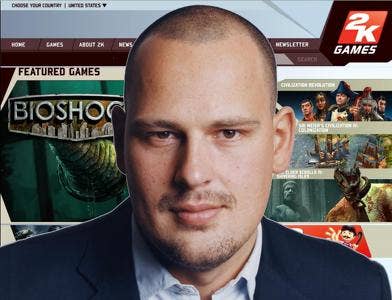2K's Christoph Hartmann: Why Consoles Will Always Matter
We interview the head of 2K Games about next-gen and finding the 'next Bungie' to compete with the likes of EA and Activision
2K Games, as a label within Take-Two Interactive, has only been around since 2005, but in that relatively short timeframe, the publisher has built up an impressive portfolio of IP and game development talent. Firaxis Games, Visual Concepts, and Irrational Games are just a few of the outstanding studios that fall underneath 2K's wing.
2K and parent company Take-Two don't have the money or muscle of the big boys like Electronic Arts or Activision Blizzard, but that doesn't mean that the publisher can't compete. 2K has to be a bit more careful about where to place its bets, and budding talent needs to be evaluated and fostered.
All of that also comes currently with the challenge of being on the cusp of next-gen in a quickly evolving market. GamesIndustry International caught up with 2K Games boss Christoph Hartmann to find out how 2K is preparing for new consoles, how important the mobile market will be, and how 2K can build up its talent to take on much bigger companies.
In general, we at 2K are always going to be positive about new hardware out there, but we are also cautious about things we aren't experienced with. We don't want to flood the market; we'd rather pick our opportunity and work well on our projects. About the Wii U itself, Nintendo is such an impressive company, they have over and over again put handheld and consoles out that are impressive. They have so much experience that I am sure they are going to do it again. With any new console, especially where something original is added, it will take time for consumers to understand it and see the beauty of it. I know that they have such clever people at Nintendo that people will see the beauty of the console, though it may take some time.
"I think the market is ready to take console gaming to the next level. It is the longest cycle we've had and it is harder and harder to launch new IPs"
Christoph Hartmann
It is not different from what we have always done. We are very careful and very selective here. When you look at the Wii, we didn't do many titles, but we put out Carnival Games, which did very well. It was probably one of the best titles. While you can't plan for it all the time, we don't throw 10 things against the wall and assume that two stick. I throw two at the wall and hope two stick, perhaps one. We have a very different approach, which has a lot to do with the size of the organization and the mindset of the organization. We always focus on one thing, and we are a very different organization than a lot of the other publishers out there.
Let's look at the market. I think the market is ready to take console gaming to the next level. It is the longest cycle we've had and it is harder and harder to launch new IPs. Consumers are very used to the big franchises, but we need innovation in terms of content to really drive things. I think the market is ready to take it to the next level. As for us getting ready for what is coming one day, we really do not have any concrete plans. It is pretty much the same like always. It's the same for Wii U - we are awaiting new things and want to try out new things, but we are cautious about where we put our efforts and then will really get behind it. If you look at the last couple of years, we don't flood the market with titles. We focus on one title after the other, and... that is the approach we are taking.
To be honest, I think I like it because it puts me in a position where I can surprise. One day, people will look back and say that something is bigger than they expected. They can take a snap-shot and make a quick comment to make a story. I really believe in what we've achieved, and I don't want to sound arrogant, but we do a lot of work as an organization and we achieved something great. How people see it from the outside, there is nothing I can do, they have their opinion. 2K has been succeeding and we've been doing really well compared to other people. There are companies that have been around for 20 years and we've been around for one generation. I'm pretty impressed, and so are people who know how hard it is; they know that we've done a lot. I'm not too fussed about their opinions and I'm not judging them.
Being afraid that a title doesn't work is a fear you always have until the day it launches. It doesn't matter what you score or what the expectations are. You never know in entertainment. Some major movies or games have been hyped and didn't live up to expectations. The proof is always in the pudding. With new IP, you have to look at the landscape. A game is about a dream of being someone you are not. That's where it starts. In the old days, it was much easier. 10 or 20 years ago, if you wanted, for example, to be a skateboarder, a game could be made and you'd live the illusion of being a skateboarder. Today though, it's harder because those kinds of straightforward titles are taken with other titles, and getting better and better. So if you stop and look at games like BioShock and Borderlands, they really made sure to have a focus on co-op, amazing story and things like that; they are really different and amazing. The story Ken Levine is writing is very different. It's really like genre mixing.

You have to find people that are motivated and believe in themselves and then keep in mind that you are a business and manage it the right way. You have to have a balance between the business side and the creative side to have the right product to entertain people. Sounds easy, right? [laughs]
"I think it is on us to find people like that, find those hidden gems and really build them. Some of the biggest guys now are the ones that took 20 years to get to where they are now"
Christoph Hartmann
There are two ways to build a soccer team. You can build a team over five to ten years, or you can see big teams get billions injected to buy off the best people to build a team. There is not one way that's better than the other. It just takes time to build things. Look at Bungie. They weren't formed big. They did Myth before, which was a good title, but then they had a big breakthrough thanks to Halo. They had resources from first party, but it took them time. To someone like Activision, they seem like the right investment now. That doesn't mean there won't be another Bungie, but it just takes time to build another team like that and they will always pop up.
I think it is on us to find people like that, find those hidden gems and really build them. Some of the biggest guys now are the ones that took 20 years to get to where they are now, it just takes time. I'm not saying we won't do anything, we just can never predict it. You have to be fast and more innovative than the big guys.
Ultimately, doing huge investments means huge risk. If you have risk, you have to think 10 times about every step. If you are the guy with nothing to lose, which is not us anymore, but you might as well set up three companies in that time and hopefully one will stick. I know we have done very good and great things, and someday we might do something amazing, but we will organically grow those things.
Talking about Duke, again the game was in development for, I don't know, 200 years. There are two options. We could have had the most polished title ever, or the title's development got started over and over. You and I both know that people had to start development over and over. We couldn't let it die; we just kept hitting the restart button to get the title going and get it out. The decision was made to build the title, and we still think it was the right thing to do. I feel the press wasn't really fair to the title. It was a fun title and those people in the press know that you can't say it was in development for that long. We presented the title and our developers knew what they had with the various iterations, and it would have been fairer to judge it a bit differently, but who cares. I think it was the right decision. As for the franchise, I can tell you there is not one coming this summer. If there is ever time to talk about it, we'll talk about it. Maybe we'll never talk about it.

With the brand, we're always careful about this. When it comes down to it, it is all about the quality of the game. If you make a great game and it resonates with people, you have a franchise. Just because you have a franchise does not mean the game will sell if it is bad. We should never say that we should make a game because we have a big franchise. Again, we have to build a great game. The brand can help a lot, but ultimately it is the entertainment product. If it is good, it will find its way to the consumer. If you look at the other brands, movie licenses like Spider-Man got really big, but it got big because it had great games - same with Batman recently. It wasn't just because it was a brand that was well known. There are a lot of games with huge brands behind them that simply haven't done well.
"Mobile will be a larger part of the market, but it is not the holy grail... there is a place for everything, but I don't think anything is ever going to replace the consoles given the maturity of the market"
Christoph Hartmann
It definitely is a platform and area that we are looking at very closely. If you look at Civilization, it was one of the best-selling games on the iPhone and iPad. We definitely are committed to that area of the business. We're definitely looking at other IPs that we have to see if they work on mobile. We're not just going to take some random IP and throw it on there. We're going to make good games, and we're also looking at doing something original one day.
We don't think it will be a revolution to the business, though. No one will ever be able to replace the power of the console business - having a console with that power and the opportunities for quality games is very important. And while being able to pick it up and being convenient is a big thing, and your phone and calendar are there, playing and carrying around games is nothing new. It will be a larger part of the market, but it is not the holy grail of the market and the business. Look at the history, there is a place for everything, but I don't think anything is ever going to replace the consoles given the maturity of the market.
I semi-disagree with him because the way your games are going to get transmitted from one source to the gamer might change, but I'm talking about big, huge quality games. It is like how people consume food. Fast food is on the rise and that has to do with our lifestyle, but there are high quality restaurants that are not going away. When I talk console games, I'm talking about huge experiences with many hours of gaming... and you will always need a major platform for those titles.
I don't know what we will have in the future, maybe a PS 15 or something, but we will need the hardware. It's like in the software industry, the software pushes the hardware; there's a give and take and it's the same in video games. We need machines built to perform well in one area, and that is gaming. You're never going to be able to compete with it because it's about quality and it's built to do one thing best. And, by the way, the whole streaming and cloud thing is just nice words until the [internet infrastructure improves]. I don't believe in cloud gaming until a cable provider stops breaking my internet connection every morning, when everyone logs in at the same time. I don't see this being fixed for a long, long time.
"To dramatically change the industry to where we can insert a whole range of emotions, I feel it will only happen when we reach the point that games are photorealistic"
Christoph Hartmann
It's something that comes up internally a lot and in product development. What's the difference between the movies and gaming? Movies you just watch. You get emotional involvement in both, but in gaming you interact. That limits you already in what you can do, as certain emotions can't be recreated. Recreating a Mission Impossible experience in gaming is easy; recreating emotions in Brokeback Mountain is going to be tough, or at least very sensitive in this country. It's limiting. Comedy is already very hard in video games. You can't have a game simply built around comedy. It has to be part of an overall vibe. So there is only a certain area that you can use [to create games] and then you look at technology, you can kind of maybe make people look right, but it will be very hard to create very deep emotions like sadness or love, things that drive the movies.
Until games are photorealistic, it'll be very hard to open up to new genres. We can really only focus on action and shooter titles; those are suitable for consoles now. If someone comes up with a video game where it's all about you falling in love, where you have the emotions and you don't need a lot of interaction from your device, that's great but what happened to those interactive movies from the '90s? They were boring. It was like a movie that gave you three endings.
Every new platform changes video gaming because it is able to do certain things. When you look at how many open-world games are out there, that was not doable for most people 20 years ago. Other huge games like Skyrim simply weren't able to be done. Every time the technology advances, new things will open up and be created. To dramatically change the industry to where we can insert a whole range of emotions, I feel it will only happen when we reach the point that games are photorealistic; then we will have reached an endpoint and that might be the final console.
It will then be all just about the content, and no longer about the technology. Right now, this industry is about the content but also about the technology. We're still a tech industry and driven by programmers. Once you get to where it looks like real life, you can focus on doing other things, and it won't be about technology as much as it is now. Until then, I think there will always be new tech, consoles, devices or whatever to drive the industry.









